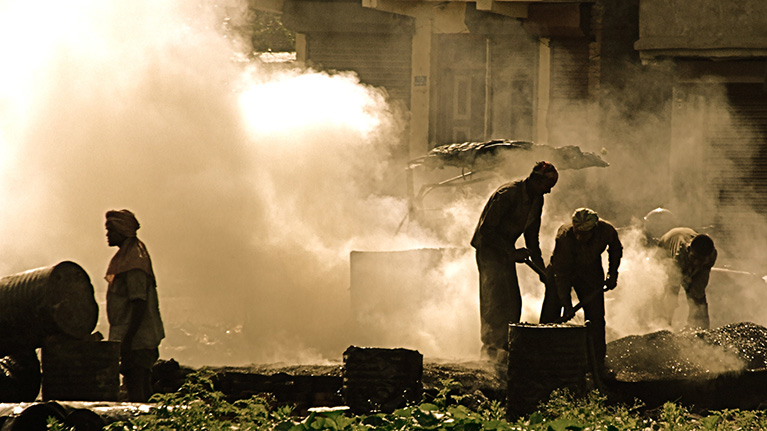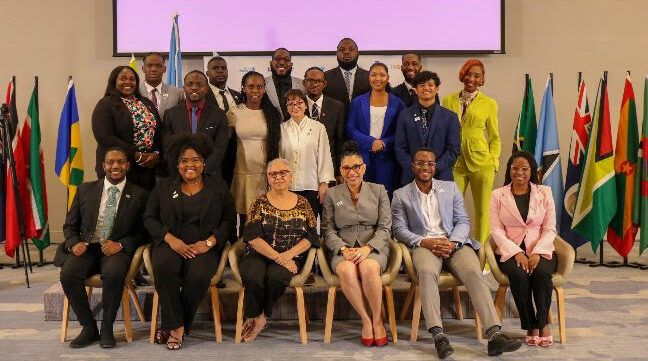This news article is a production distributed through Caribbean News Service. It is made freely available to your media and we encourage publishing and redistribution, giving credit to Caribbean News Service (CNS).
By Desmond Brown
NEW YORK, Apr 23 2016, CNS – Antigua and Barbuda’s Prime Minister Gaston Browne said the government he leads fully understands that climate change is a real issue, one of the greatest threats facing humankind and he is mobilising his fellow legislators and residents of the small island-nation to become climate ready by implementing national activities on climate change.
Browne spoke with Caribbean News Service (CNS) shortly after he and 170 world leaders declared an end to the fossil fuel era, using the signing ceremony of the landmark Paris agreement as an occasion to renew their vows to fight climate change.
Diversifying the Energy Mix
“Even before Paris and here in New York today, my government has been totally committed to the issue of climate change. In fact, in our 2014 election manifesto we actually committed to reducing emissions by 20 percent by 2020,” he told CNS.
“So far we have diversified our energy mix into alternate energy to include a 10 megawatt of solar voltaic application that we have actually introduced. Three megawatts have been installed so far and during the daytime hours our V.C. Bird international Airport terminal is being powered exclusively by solar power.”
The government is spending in excess of US$21 million for the solar voltaic facility.
In addition, Browne said another facility will be built later this year, funded under the IRENA (International Renewable Energy Agency) programme that will make available an additional US$15 million.
“Both of these combined will see at least US$37 million invested within the first two and a half years of our government in renewable applications. So that is demonstrative of the commitment that we have towards the issue of climate change and to build a climate resilient economy,” said Prime Minister Browne.
The government used funds from its Citizenship by Investment Programme (US$22 million) to fund the first 10 megawatts of solar voltaic power and plans to continue using that facility to raise additional funds to diversify into other green energy applications.
“So we have actually committed to ensure that every single year we will add 10, maybe US$20 million in order to diversify into solar application,” the Antigua and Barbuda leader said.
Fully committed to climate change fight
Browne said Antigua and Barbuda has made a number of tangible interventions to show its full commitment to the issue of climate change.
“There are also some other interventions which have been made by my government, for example, the whole issue of the environment and environmental pollution, that issue has been addressed,” he explained.
“We have actually strengthened the legal framework to include the introduction of an Environmental Management Act. In addition we also introduced and Environmental Funding Act as well to facilitate the funding of Green Energy.
“In fact our strategic thrust is to ensure that we pursue development in a sustainable way and it therefore means that the whole issue of climate change is at the centre of our development,” he added.
Browne said his government intends to, in the very near future, possibly by sometime in 2017, engage in the creation of a waste to energy facility to better manage waste and at the same time create energy from the waste that is generated.
Cabinet and other Departments on board
Prime Minister Browne said he leads a Cabinet that is “fully committed” to the climate change fight.
“The Minister of the Environment who is here with me, (Molwin Joseph) has done a great job. He has played a fundamental part in the negotiations that took place in Paris, representing Antigua and Barbuda,” he said.
“Our Environment Division has ensured that Antigua and Barbuda is not left behind and they have also ensured too that other interventions are made. So for example one of the things that was done recently was the ban which was placed on plastic bags and that is also to protect the environment and to move individuals to utilise biodegradable bags.
“I know too that additional applications will be looked at in terms of dealing with the disposal or perhaps having renewable products from things like rubber tyres. So we have a comprehensive environmental plan, one that takes into account not only the protection of the environment, the natural environment, the mangroves, to ensure that there is no further deforestation, but one that look very seriously at carbon emissions as we seek to decarbonise the country’s environment.
In their first 100 days in office, Prime Minister Browne’s Cabinet approved a number of private investment projects valued in excess of three billion dollars.
The largest is the Yida Investment Group, Guiana Island Project which will see the development of the largest free trade zone in the country, an off-shore financial centre, a five-star luxury resort, internationally branded villa communities, a casino and gaming complex, a multi-purpose conference centre, a 27-hole golf course, a marina and landing facilities, commercial, retail, sports and other auxillary facilities.
Headquartered in western Beijing, Yida International Investment Group was founded in 2011.
But Yida’s clearing of mangroves on Guiana Island to start the proposed development raised the ire of local environmentalists who launched an online petition calling on Prime Minister Browne not to allow the Chinese developers to break laws and to conserve the Marine Protected Areas.
Guiana Island, located off the northeast coast of Antigua between the Parham Peninsula and Crump Island, is the fourth largest island of Antigua and Barbuda. It is a refuge for the Fallow Deer, Antigua’s national animal.
Aggressive climate change programme
Browne said since his administration took office, they have pursued a very aggressive climate change programme pointing to the susceptibility of Antigua and Barbuda, both of which are small low-lying islands, to sea level rise.
“We have suffered from severe droughts for the last three years and as a result we have had to spend large amounts of funds in order to purchase desalination facilities in order to convert salt water into fresh water and that is a very expensive. It’s clearly one of the effects of climate change,” he said.
“As you know even though there is a general commitment to ensure that global temperatures do no exceed 1.5 degrees Celsius, as you know it’s not a firm commitment, even though we hope that all countries will work towards that particular goal.
“We are playing our part to ensure that we have a sustainable environment one in which we can preserve the environment, not only for our use but certainly for future generations. In other words it’s not only about keeping the planet healthy but it’s also keeping our country healthy, it’s about keeping out people healthy,” Browne added.




